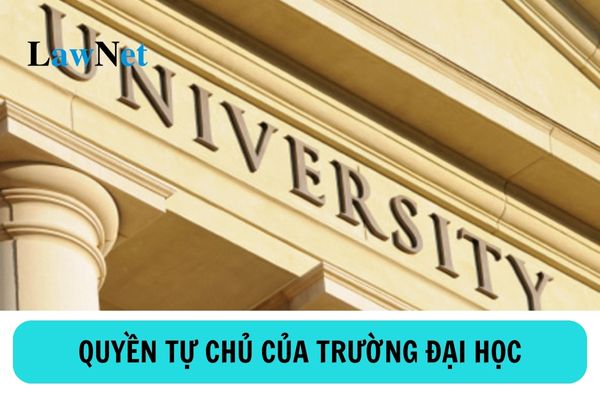What are the conditions for universities to exercise autonomy in Vietnam?
What are the conditions for universities to exercise autonomy in Vietnam?
According to Clause 2, Article 32 of the Law on Higher Education 2012 as amended by Clause 17, Article 1 of the Law on amendments to Law on Higher Education 2018, the conditions for universities to exercise autonomy are as follows:
- The establishment of a University Council and a Higher Education Council; recognized as meeting the quality standards of higher education institutions by a legitimate educational quality accreditation organization;
- Issued and organized the implementation of organizational and operational regulations; financial regulations; internal management regulations, processes, and policies to ensure quality standards as stipulated by the State;
- Delegated autonomy and accountability to each unit and individual within the university;
- Public disclosure of quality assurance conditions, accreditation results, the employment rate of graduates, and other information as legally required.

What are the conditions for universities to exercise autonomy in Vietnam? (Image from the Internet)
What are the regulations on autonomy in terms of academic and specialized operations of universities in Vietnam?
According to Clause 1, Article 13 of Decree 99/2019/ND-CP, regarding autonomy in terms of academic and specialized operations of universities are allowed to:
- Issue and implement internal regulations on enrollment activities, training, science and technology, domestic and international cooperation in accordance with the law;
- Determine and publicly announce the methods, admission quotas according to the regulations of the Ministry of Education and Training, except for fields of national defense and security which are regulated by the direct management agency;
- Decide on the methods of organizing and managing training programs across different levels and forms of education;
Develop, appraise, and issue training programs in accordance with the Vietnamese qualifications framework and training program standards, ensuring no harm to national defense, security, public interest, historical integrity, cultural values, ethics, traditional customs, unity of Vietnamese ethnic groups, world peace, or security, and not include religious propaganda;
Compile, select, appraise, approve, and use teaching materials and higher education curricula (except for compulsory subjects); organize the implementation and evaluate the quality of higher education training programs;
Design templates, print forms, issue, and manage diplomas and certificates as per legal regulations;
- Make decisions on distance education and collaborate in training at the undergraduate level in a part-time basis with qualified domestic educational institutions as per legal regulations;
- Make decisions on science and technology activities as stipulated in Article 16 of Decree 99/2019/ND-CP; and decide on international cooperation activities as specified in Clauses 3, 5, and 6, Article 44 of the Law on Higher Education 2012, in accordance with the law;
- If the conditions for autonomy as stipulated in Clause 17 are met, may autonomously open new training programs as stipulated in Clause 18, and autonomously collaborate on training with foreign entities as stipulated in Clause 30, Article 1 of the Law on amendments to Law on Higher Education 2018;
Universities are granted the autonomy to decide on opening new training programs and collaborating on training with foreign institutions for member universities and training units under the university that meet the requirements for opening new programs as stipulated in Clauses 1 and 2, Article 33, and collaboration on training with foreign entities as stipulated in Article 45 of the Law on Higher Education 2012.
Member universities of the university have the autonomy to decide on opening new training programs and collaborating on training with foreign entities when meeting the requirements for opening new programs as stipulated in Clause 3, Article 33, and collaboration on training with foreign entities as stipulated in Clause 5, Article 45 of the Law on Higher Education 2012, in accordance with the university’s organization and operation regulations.
Universities that do not meet the conditions stipulated in Clause 17, Article 1 of the Law on amendments to Law on Higher Education 2018 shall open new programs and collaborate on training with foreign entities as per legal regulations.
- Exercise other rights of autonomy in terms of academic and specialized operations in accordance with the law.
What are the regulations on autonomy in terms of finance and property of universities in Vietnam?
According to Clause 3, Article 13 of Decree 99/2019/ND-CP, the autonomy in terms of finance and property of universities are as follows:
- Public universities exercise financial and asset autonomy according to the Law on Higher Education 2012, the Law on amendments to Law on Higher Education 2018, and current regulations on the autonomy mechanism of public service providers;
- Private universities and non-profit private universities exercise financial and asset autonomy according to the Law on Higher Education 2012, the Law on amendments to Law on Higher Education 2018, and related legal regulations; the State shall support its development in accordance with the budget capacity and regulations on investment in higher education development;
- Universities must issue and implement internal financial and asset regulations, exercising other autonomy in terms of finance and property according to the Law on Higher Education 2012, the Law on amendments to Law on Higher Education 2018, and other relevant legal regulations.

